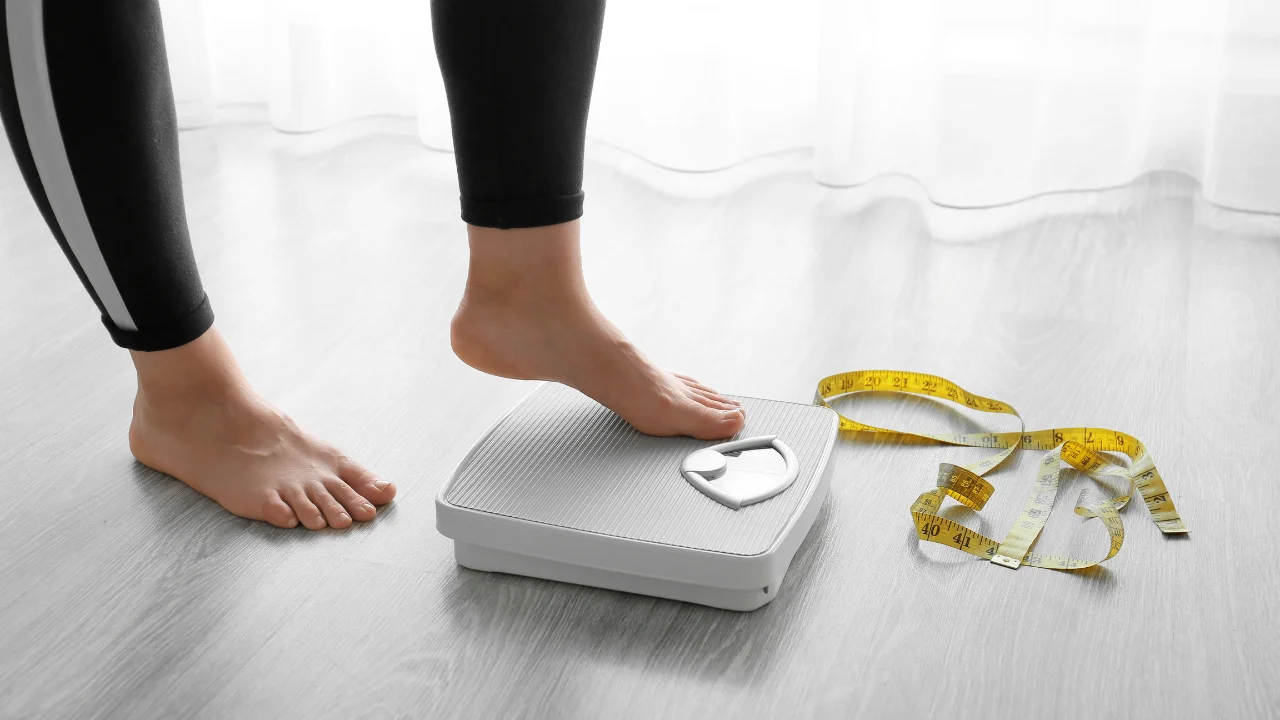Unlocking the Secrets of Menopause-Related Weight Gain in Women: A Comprehensive Guide
TABLE OF CONTENTS
- PODCAST: Menopause & Weight Gain
- Why am I gaining body fat/ weight so fast during menopause?
- What is the average weight gain during menopause?
- What age does menopause weight gain start?
- Why is it so hard to lose weight during menopause?
- Why am I gaining weight so fast all of a sudden?
- Is it possible to lose weight during menopause?
- How can I stop weight gain during menopause?
- Conclusion
Menopause is a natural part of every woman’s life, marking the end of reproductive years. While it brings a sense of liberation from monthly periods, it also comes with a host of physical changes, including weight gain.

Many women find that they gain weight during menopause, even if they have not changed their diet or exercise routine. This can be frustrating and confusing, as the cause is not always obvious. In this article, we will explore the secrets of menopause-related weight gain, from the hormonal changes that occur during menopause to lifestyle factors.
By understanding the underlying causes, women can take control of their health and make informed decisions about their diet, exercise, and overall well-being. This comprehensive guide will provide practical tips and insights to help women navigate this challenging time and maintain a healthy weight, and eradicate belly fat during and after menopause.
TEAM Bootcamp & the Menopause
After years of coaching women of all ages and stages of life, we at TEAM Bootcamp have noticed a common theme among our clients: menopause-related weight gain and excess belly fat.
As many women approach this stage of life, they often find it challenging to maintain a healthy body weight and lifestyle. Hormonal changes, sleep disturbances, and other various menopause weight gain-related symptoms can make it difficult to stay motivated and achieve fitness goals.
That’s why we have decided to launch a series of menopause retreats, designed specifically to address the unique needs of women going through this transition.
Our retreats will provide a safe and supportive environment for women to learn about the latest research on menopause and weight management, as well as practical strategies to improve their diet, exercise regime, and overall well-being. With our experienced trainers and holistic approach to health and fitness, we are confident that our menopause retreats will help women navigate this challenging time and emerge feeling stronger, healthier, and more confident than ever before.
Meet The Panel
In the creation of this article, we interviewed a host of past and present women’s retreat clients to get the ‘inside track’ on their results and experience, spoke to the coaches, trainers and chefs on weight loss front line and polled over 5000 boot camp graduates to make this the most informative post about menopause related weight loss in the UK.

Craig – Bootcamp Founder

Paula – TEAM Bootcamp & UK Menopause Retreats Founder
Karen – Nutritionist & Yoga Instructor
Why am I gaining body fat/weight so fast during menopause?
There are several reasons why women gain more weight when during menopause. One of the most significant factors is hormonal changes. As women approach menopause, their estrogen levels begin to decline, which can affect their metabolism and cause them to store more fat around their midsection. This can result in a faster rate of weight gain, even if their diet and exercise habits have not changed.
Another factor that can contribute to menopausal weight gain is a decrease in muscle mass. As women age, their muscle mass naturally decreases, and this process can be accelerated during menopause.
This is important because muscles are more metabolically active than fat, meaning they burn more calories at rest. As a result, a decrease in muscle mass can lead to a slower metabolism and make it easier to see women gain weight again.
In addition to these physiological changes, lifestyle factors can also play a role in menopause-related weight gain. For example, women may experience more stress during this time, which can lead to emotional eating and other unhealthy habits. They may also find it harder to maintain an active lifestyle due to menopause-related symptoms such as fatigue and joint pain.
Overall, menopause-related weight gain is a complex issue with many contributing factors. By understanding these and other factors, and making lifestyle changes, women can take control of their body composition, and health and maintain a healthy weight during and after menopause.
Menopause and Weight Gain Simplified
Dr. Becky Gillaspy
“It’s the optimal amount of time to get the most out of all aspects of boot camp” – Ricci
“Good results, kick start a healthier lifestyle.” – Nicola
What is the average weight gain during menopause?
The average weight gain during menopause varies among women and can range from no weight gain to as much as 10-15 pounds. However, studies have shown that the average weight gain during menopause is between 5-10 pounds.
It’s important to note that weight gain during menopause is not inevitable, and women can take steps to prevent or manage weight gain during this time. Factors such as genetics, lifestyle habits, and menopause-related symptoms can all contribute to weight gain during menopause, and the degree of weight gain can vary among individuals.
It’s also worth noting that weight gain during menopause may not always be related to menopause specifically, as women’s bodies change with age, and lifestyle factors can play a significant role in why menopause weight gain is managed.
By maintaining a healthy lifestyle, including a balanced diet and regular exercise, women can help to prevent or manage weight gain during menopause and maintain a healthy weight throughout their lives.
What age does menopause weight gain start?
The age at which women experience weight gain starts can vary. On average, most women begin to experience perimenopause, the transitional period leading up to menopause, in their mid-40s. Perimenopause can last for several years and is characterized by hormonal fluctuations and irregular menstrual cycles. During this time, women may experience weight gain due to changes in metabolism and hormonal shifts.
For some women, weight gain during perimenopause can start as early as their late 30s, while others may not experience significant weight gain until after menopause occurs. It’s important to note that weight gain during menopause is not solely determined by age, but rather by a combination of factors, including genetics, lifestyle, and hormonal changes.
Women who are at a higher risk of weight gain during menopause may benefit from taking proactive steps to maintain a healthy weight, such as engaging in regular exercise, focusing on a balanced diet, managing stress and ensuring they remain physically active. By making these healthy lifestyle choices, women can help to prevent or manage weight gain during menopause and maintain a healthy weight throughout their lives.
Why is it so hard to lose weight during menopause?
Losing weight during menopause can be challenging for several reasons. One of the main reasons is the hormonal changes that occur during this time. As women go through menopause, their estrogen levels decline, which can affect their metabolism and make it harder to ditch belly fat especially. This can result in a slower metabolism and an increased likelihood of storing fat around the midsection often in spite of eating fewer calories whilst dieting.
Another factor that can make it difficult to lose menopause weight during menopause is a decrease in muscle mass. As women age, their muscle mass naturally decreases, and this process can be accelerated during menopause. Since muscles are more metabolically active than fat, a decrease in muscle mass can lead to a slower metabolism, making it harder to burn calories and body fat.
In addition to these physiological changes, lifestyle factors can also play a role in the difficulty of losing weight during menopause. Women may experience more stress during this time, which can lead to emotional eating and other unhealthy habits. They may also find it harder to participate in regular exercise and maintain an active lifestyle due to menopause-related symptoms such as fatigue and joint pain.
Overall, losing weight during menopause requires a holistic approach that addresses both physiological changes and lifestyle. Women may benefit from focusing on a balanced diet to help control blood sugar, engaging in regular exercise that includes both cardio and strength training, managing stress, and getting enough sleep. By making these healthy lifestyle choices, women can help to combat the effects of menopause-related weight gain and achieve their goals.
Why am I gaining weight so fast all of a sudden?

Many women find it challenging to prevent weight gain during menopause. There can be several reasons for this, including physiological changes and lifestyle factors.
One reason why women may struggle with their overall fat mass during menopause is due to changes in metabolism and fat storage. As women age, their metabolism naturally slows down, making it more difficult to burn calories and easier to store fat. Additionally, as estrogen levels decline during menopause, women may experience a decrease in muscle mass, which can further slow down their metabolism and altering their fat distribution and body composition.
Another factor that can contribute is hormonal imbalances. Menopause can cause fluctuations in hormones such as estrogen, progesterone, and testosterone, which can affect appetite, metabolism, and energy levels. These changes can lead to increased hunger and cravings, making it harder to stick to a healthy diet.
Stress, lack of sleep, and sedentary behaviour can also make it difficult. High levels of stress can lead to emotional eating and other unhealthy behaviours that can contribute to weight gain. Additionally, sleep disturbances can affect hormones that regulate appetite and metabolism, leading to increased hunger and cravings.
In summary, losing weight during menopause can be challenging due to a combination of physiological changes. By focusing on a healthy diet, regular exercise, stress management, and adequate sleep, women can help to combat the effects of menopause-related weight gain and reduce excess fat. Additionally, consulting with a healthcare provider or a nutritionist can provide tailored guidance to address individual concerns and provide an effective weight management plan during menopause.
Is it possible to lose weight during menopause?

Yes, a postmenopausal woman can lose weight despite her menopause symptoms. While losing weight during and after menopause symptoms may be more challenging than it was earlier in life, it is still possible with a combination of healthy nutrition, regular exercise and physical activity and other lifestyle habits.
First and foremost, postmenopausal women should focus on a balanced, nutrient-dense diet that is low in processed foods, added sugars, and saturated fats. Eating plenty of fruits, vegetables, lean proteins, and healthy fats can help to support a healthy weight, control blood sugar and provide the necessary nutrients for optimal health. Additionally, postmenopausal women should aim to engage in regular exercise, including both cardiovascular and strength training activities, and moderate aerobic activity, which can help to maintain muscle mass and support metabolism.
Managing stress, getting enough sleep, and staying hydrated are also essential components of weight loss during and after menopause. Women should aim for at least 7-8 hours of sleep per night, find healthy ways to manage stress and drink plenty of water to support their weight loss goals.
It’s also important to note that individual needs and factors vary, so it’s important to work with a healthcare provider or nutritionist to develop a personalized weight loss plan that takes into account individual needs and goals.
How can I stop weight gain during menopause?

Menopause-related weight gain is a common concern for many women, but there are several & strategies that can help prevent or manage it.
Focus on a healthy diet:
Eating a nutrient-dense, balanced diet is key to maintaining a healthy weight during menopause. Focus on whole, unprocessed foods such as fruits, vegetables, whole grains, lean protein, and healthy fats. Avoid processed and high-sugar foods and saturated fat which can lead to weight gain. This will also help prevent high blood pressure, cardiovascular disease, heart disease and other health risks.
At TEAM Bootcamp we’re a strong advocate for the ketogenic diet due to its positive effect on hormones, blood sugar and stubborn body fat.
Engage in regular exercise:
 Regular exercise is crucial for maintaining a healthy weight and overall health during menopause. The right amount of physical activity for you will depend on your goals and personal circumstances. As a minimum aim for at least 150 minutes of moderate-intensity exercise per week, such as brisk walking, cycling, or swimming. Women tend to favour cardio training, but be sure to include strength training exercises such as lifting weights and other muscle-strengthening activities, not just aerobic exercise to maintain muscle mass and support metabolism.
Regular exercise is crucial for maintaining a healthy weight and overall health during menopause. The right amount of physical activity for you will depend on your goals and personal circumstances. As a minimum aim for at least 150 minutes of moderate-intensity exercise per week, such as brisk walking, cycling, or swimming. Women tend to favour cardio training, but be sure to include strength training exercises such as lifting weights and other muscle-strengthening activities, not just aerobic exercise to maintain muscle mass and support metabolism. Manage stress:
Manage stress:High levels of stress can contribute to menopausal weight gain, so finding healthy ways to manage stress is essential. Try relaxation techniques such as meditation, deep breathing, or yoga.

Sleep well:
Sleep disturbances are common for menopausal women and can contribute to weight gain, but how much sleep do you require? Scientific evidence suggests you should aim for 7-8 hours of sleep per night and establish a consistent sleep routine to improve sleep quality and avoid triggering hunger hormones.

Hormone replacement therapy (HRT):
HRT can help alleviate menopause-related symptoms, including hot flashes, and weight gain by controlling hormones such as estrogen levels. However, menopausal hormone therapy is not suitable for everyone and should be discussed with a healthcare provider or talk to your doctor.
Consider other medications:
Certain medications such as antidepressants, antipsychotics, and corticosteroids can contribute to weight gain. If you are taking these medications, talk to your healthcare provider about possible alternatives.

Conclusion
In conclusion, weight gain is a common issue that most peri & post-menopausal women face during their menopause transition phase of life. However, with the right guidance, regular exercise, controlled calorie intake and support, women can take control of their health, ditch the excess pounds and maintain a healthy weight and better body shape during and after menopause.
That’s why we at TEAM Bootcamp have launched our New Horizons Menopause Retreat, designed specifically to address the unique needs of women undergoing this transition. Our retreats provide a safe and supportive environment for women to learn about the latest research on menopause and weight management and practical strategies to improve their diet, exercise routine, and overall well-being.
With our experienced trainers and holistic approach to health and fitness, we are confident that our menopause retreats will help women navigate this challenging time and emerge feeling stronger, healthier, and more confident than ever before. Don’t wait to take control of your health during menopause. Join us at our New Horizons UK Womens Retreat and discover the tools and support you need to live your best life.

